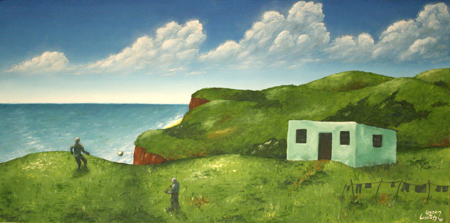This blog has moved to wandering.co.za – please check it out there.
Speedpainting: Landscape 1
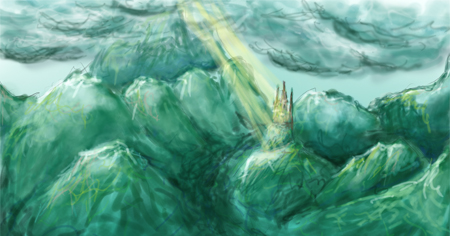
Here is a quick sketch I did as an excercise in speedpainting. I would like to get more practice doing digital art (there are things one can do with a wacom & photoshop that can’t be done on canvas), and furthermore digital art lends itself well to quick yet striking sketches.
This is, admittedly, an early effort and not particularly good, but one needs to start somewhere. I hope to get more practice, and thereby improve in time…
Sketches with Harmony
I discovered Harmony, a very cool tool for making sketches. It is written using the javascript port of the Processing language, and utilises procedural methods to augment the various different brushes. I first saw work by Rob Sheridan made using it, and then gave it a try myself. It’s a lot of fun, and I think could be used to create some extremely interesting art. Here are some of my experiments:
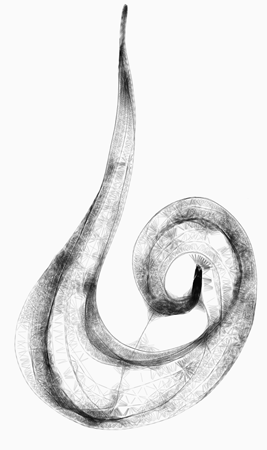
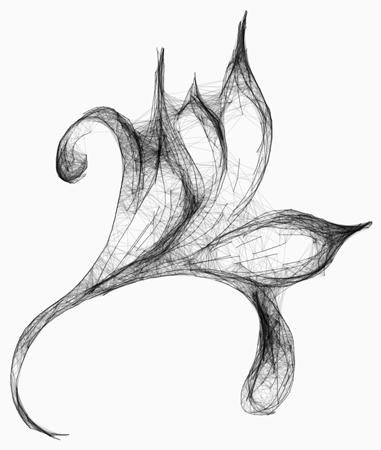
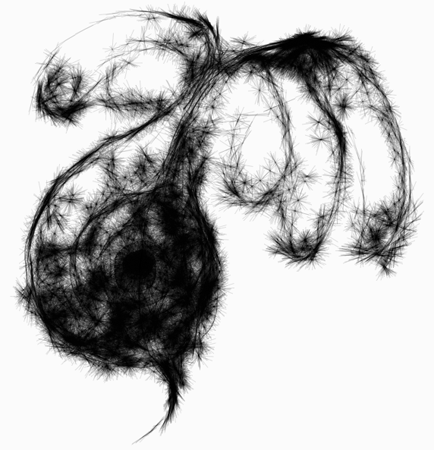
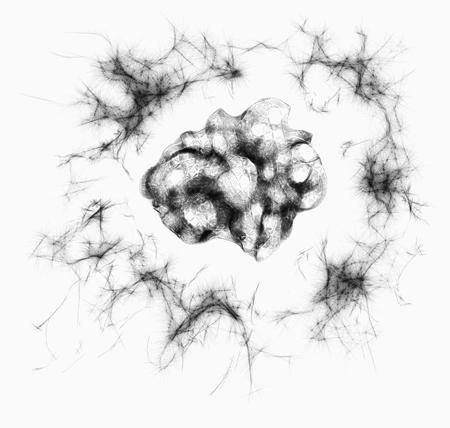
Possession
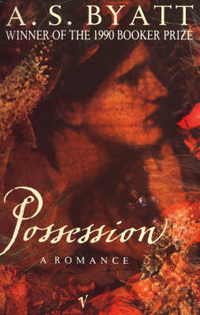 The new year finally brought me to start reading AS Byatt romance Possession.
The new year finally brought me to start reading AS Byatt romance Possession.
This is a truly exquisite work, one of a limited number of books I’ve read that I would properly describe as literature. Telling the tale of two (post)modern academics researching the relationship between two nineteenth-century poets, the book brilliantly weaves together not only the developments between these various characters, but also brings in the thrill of a detective chase as history is gradually uncovered, provides a very sharp satire on modern academia, as well as providing insight into and commentary on Victorian life. All this is written in an intelligent and eloquent fashion, unashamedly intellectual with continuous allusions to other texts and philosophies.
And ultimately, Possession also presents a plot that is gripping, which refuses to be put down. Truly magical!
Ilizwe Lam
A painting drawing inspiration from the beautiful Wild Coast in the Eastern Cape (South Africa).
The following poem, in Xhosa, appears along the clouds:
Apha kule ndawo intle,
Siyalibon’ ilanga xa liphuma ekuseni nalitshona ngokuhlwa.
Siyawuva umoya awusukelayo amafu esibhakabhakeni.
Abantu abahlal’ apha bayazazi,
Iinyawo zabo ziphethwe ngumhlaba.
Jonga! Nanzi iindidi ngeendidi zezinto.
Eli lizwe lezizwe ezininzi lilikhaya lentliziyo yam.
Rough translation:
Here in this beautiful place,
We see the sun when it rises in the mornings and when it sets in the evenings.
We feel the wind that chases the clouds across the sky.
The people what live here, they know themselves,
Their feet are carried by the ground.
Look! Here there are all manner of things.
This country of many nations is the home of my heart.
What I Talk About when I Talk About Running
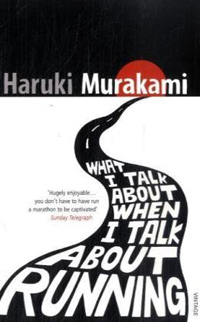 I was given Haruki Murakami’s What I Talk About when I Talk About Running by a friend and fellow running enthusiast, and found it an incredibly moving and relevant read.
I was given Haruki Murakami’s What I Talk About when I Talk About Running by a friend and fellow running enthusiast, and found it an incredibly moving and relevant read.
Written almost as memoirs, this short work provides insight into both Murakami’s life as a novelist, and more important into his experiences as an amateur long-distance runner (marathons and the like). Given my own love of long-distance running (although I have yet to run anything mentionably longer than a half-marathon), I found great resonance with Murakami’s writing, and especially the joys and pains and motivations for running.
A gem of a book, and one I’d recommend to anyone who loves to be out running alone, with nothing but the regular beat of their footsteps keeping them company.
The Oxford History of South Africa, Part 2
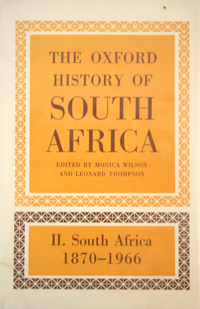 I started reading The Oxford History of South Africa slightly over a year ago, and while it has been very interesting and rewarding to learn more of the history of my country, this two-volume tome is anything but an easy read. The text is dry, academic, densely printed and the pages are thin and numerous.
I started reading The Oxford History of South Africa slightly over a year ago, and while it has been very interesting and rewarding to learn more of the history of my country, this two-volume tome is anything but an easy read. The text is dry, academic, densely printed and the pages are thin and numerous.
I am glad that I managed to finish it, however. I was once again impressed by the objective and impartial account given of events (especially given that this history was written in the late 1960’s), and am now much better informed about the development of South Africa.
I do, however, now need to find a reliable and unbiased history which covers the years after 1966 (as this only continues till then) – a task which, I fear, will not be trivial 🙂
A Rustle in the Grass
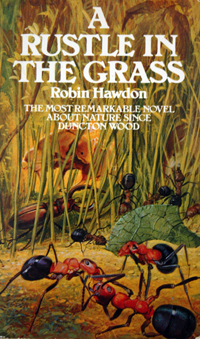 I found Robin Hawdon’s novel A Rustle in the Grass quite serendipitously at a second-hand bookstore, and was immediately intrigued by the idea of a serious novel set in an ant colony.
I found Robin Hawdon’s novel A Rustle in the Grass quite serendipitously at a second-hand bookstore, and was immediately intrigued by the idea of a serious novel set in an ant colony.
The book is fast-paced and reads easily, but still presents a remarkably deep and interesting story with excellent analogies relating to our own society and lives.
This was an unexpected gem of a novel, and one I thoroughly enjoyed (I read it almost continuously in a single day).
Through the Language Glass
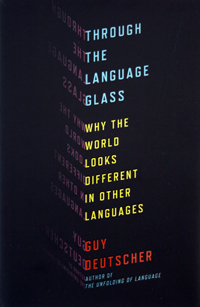 Through the Language Glass is the second book on linguistics by Guy Deutscher that I’ve read recently (the other being The Unfolding of Language).
Through the Language Glass is the second book on linguistics by Guy Deutscher that I’ve read recently (the other being The Unfolding of Language).
This popular science book explains various differences between languages, and tackles the rather thorny question of whether the language we think in affects our thoughts in any fundamental way.
Deutscher argues his points well, and I cannot disagree with any of the conclusions he reaches. Nevertheless, as the ultimate point is while that language has an impact on our thoughts and experiences this impact is relatively minor, this book has little that is truly surprising or unexpected.
It is still an interesting and enjoyable read, however, and recommended to those interested in linguistics.
A See-through Suitcase
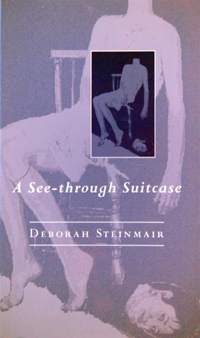 A See-through Suitcase is a short anthology of poetry by Deborah Steinmair, a South African poet. She manages to capture beauty and tragedy in a truly exquisite and poignant way – the poems in this anthology are very honest, and have that special type of simplicity that hides great complexity.
A See-through Suitcase is a short anthology of poetry by Deborah Steinmair, a South African poet. She manages to capture beauty and tragedy in a truly exquisite and poignant way – the poems in this anthology are very honest, and have that special type of simplicity that hides great complexity.
I read too little poetry, and anthologies like this remind me why that’s a bad thing.
